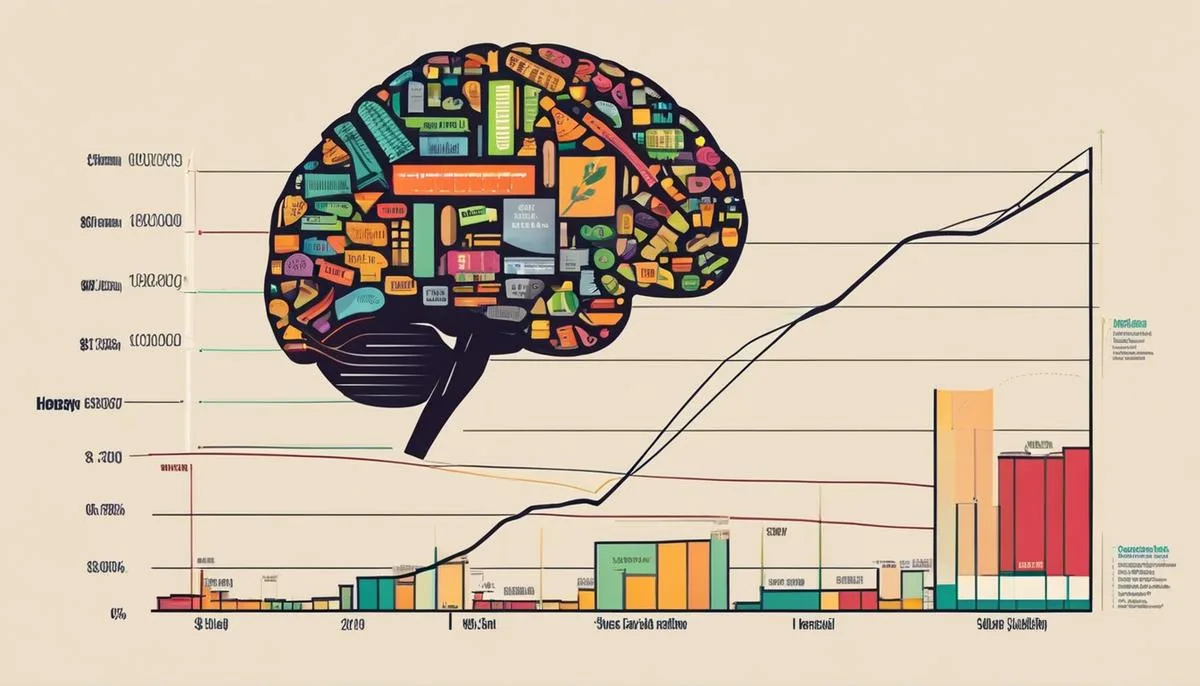The increase in childhood obesity has become a significant cause for concern across the globe, and it’s no longer viewed as a stand-alone health challenge. It intertwines with another prevalent issue troubling today’s youth – mental health disorders. The complexities of these interconnected public health crises call for a comprehensive exploration and understanding. It’s crucial to delve into the complex interactions between childhood obesity and mental health, examining the underlying biological and psychological mechanisms that tie the two together.
1. The Relationship between Childhood Obesity and Mental Health
The Interplay Between Childhood Obesity and Mental Health: A Deep Dive into a Multifaceted Phenomenon
It is without a shadow of a doubt that the alarming rise in the prevalence of childhood obesity in recent decades is a global public health concern of monumental proportions. Childhood obesity is not merely a harbinger of numerous physical health conditions, but it also intersects extensively with mental health issues. The attendant interrelations are intricate and multilayered, necessitating extensive scrutiny from the scientific and academic domains.
The preliminary evidence gleaned from several cross-sectional and longitudinal studies clearly indicates an associative relationship between childhood obesity and an elevated risk of experiencing mental health problems. This correlation should not be taken lightly – it highlights the ramifications that extend far beyond the physical domain. The mental health disorders linked with childhood obesity encompass depression, anxiety, low self-esteem, body dissatisfaction, and eating disorders.
Obesity is attributed to biochemical alterations that may precipitate mental health issues. The excessive adiposity characteristic of obesity engenders a state of chronic low-grade systemic inflammation. This prolonged inflammatory condition is known to alter brain functions, potentially heightening the chances of depressive symptoms among obese children.
In the same vein, mental health conditions can also act as a catalyst for obesity. For example, children grappling with depression may display disordered eating behaviors, leading to significant weight gain. Hence, obesity and mental health problems often create a vicious interlocking cycle, each augmenting the consequences of the other.
The psychosocial aspects also provide a discerning viewpoint. Overweight and obese children frequently report being victims of bullying, which can inflict immense emotional distress, dent their self-esteem, and stir feelings of loneliness and sadness. Such negative experiences can morph into mental health issues and foster unhealthy eating habits, both of which exacerbate the obesity problem.
The early identification of children at risk for both obesity and mental health problems becomes crucial in this context. Implementing intervention strategies that target both obesity and mental health could provide an efficient, synergistic approach to mitigate these comorbid conditions. These interventions may take the form of family-based lifestyle modifications, psychological therapies, and school-based programs.
It is vital to remember that children are not solely responsible for their weight; numerous genetic, environmental, and socio-economic factors implicate their obesity status. Therefore, any intervention needs to address both individual behavior and broader societal factors that contribute to the obesity epidemic.
Taking all into account, it becomes evident that childhood obesity and mental health are inextricably linked in a multidimensional interplay. The comprehensive understanding of this complex relationship demands a rigorous multi-disciplinary approach, integrating insights from pediatrics, psychology, psychiatry, social sciences, and more. Only through this collaborative approach can we hope to unravel the complexities of this pressing issue and chart a course for healthier futures for the children across the globe.

2. Mental Health Consequences of Childhood Obesity
Childhood obesity is far more than a mere physical health problem; its effects penetrate into the sphere of mental health, shaping an overwhelming interconnected web of influence. The residual impacts of obesity-related stigmatization and discrimination run deep, affecting the psychological well-being of children to a considerable degree.
Through empirical evidence, it has been substantially established that childhood obesity can lead to poor social and school performance, behavior problems, and substandard health-related quality of life. The effects of overweight on these outcomes are often compounded by the psychological stress generated by the societal norms that extol thinness and privilege those who conform to the standard.
Young obesity sufferers also exhibit higher rates of maladaptive behaviors and impulsivity, indicative of neurological alterations. Recent studies have provided a window into the specific neural pathways impacted by obesity, demonstrating, for instance, reduced dopamine signaling in the striatum, a region associated with reward anticipation and impulsivity. Furthermore, there exist perturbations in the prefrontal cortex (PFC), pivotal for executive control and decision-making, which could explain the self-regulatory problems embraced by obese children.
In addition to this, a constellation of somatic complaints that cannot be attributed solely to physical causes lingers around children carrying excessive weight. The intersecting somatic and mental health fallouts linked to childhood obesity warrant additional clinical attention, advocating for adequate referral to pediatric mental health specialists and an increase in the psychological monitoring of overweight children. Operand recognition and consequent comprehensive integration of physical and mental health care is vital so as to ensure the health and well-being of children across the globe.
Major research in the past decade has also explored sleep alterations in childhood obesity, which is emerging as a critical player in mental health outcomes. Overweight children have been found to experience excessive daytime sleepiness, instances of loud snoring, and high-risk indicators for sleep-disordered breathing. Sleep deficiency is associated with multiple cognitive impairments and mood disturbances, further exacerbating pre-existing mental health vulnerabilities tied to obesity.
Addressing the link between obesity, mental health, and sleep in children, taking into consideration the potential compounded risk in disadvantaged and marginalized populations, necessitates concerted efforts beyond the cleave of disciplines, sectors, and stakeholders. Bridging this gap will emerge not only as a compelling challenge but also as a promising potential for parsing the knotted tangle of determinants and outcomes associated with childhood obesity.
Lastly, the research underscores the need for fostering resilience in at-risk youth who carry excess weight. Resilience factors, such as positive school experiences, supportive relationships, and participation in physical activities, could serve as protective buffers against the adverse mental health outcomes associated with childhood obesity. Building resilience in these children not only necessitates the mitigation of risk factors but also encompasses amplifying their access to such protective factors.
Equipped with such understanding and through the combined efforts of the scientific community, policy makers, and health professionals, there indeed exists a substantial potential for a decline in the psychological fallout coincident with obesity among children, thus paving the path for a healthier future generation.

3. Implications on Treatment and Intervention Strategies
Stigma and Discrimination: Unseen Triggers of Childhood Obesity
Childhood obesity does not exist in a vacuum. Familial predispositions, sedentary lifestyles, and unhealthy eating habits indeed play significant roles in its development. However, societal factors – more specifically, stigmatization and discrimination – serve as potent, though often overlooked, drivers of obesity in children and adolescents. Research suggests that weight-based victimization can precipitate unhealthy eating behaviors and physical inactivity, propelling children into obesity and reinforcing the vicious cycle.
This form of bullying – characterized by name-calling, exclusion, teasing, and physical aggression – can have severe psychological ramifications, leading to a significant decline in self-esteem. Notably, instances of weight-based victimization have been associated with lower academic and social functioning, suggesting that its destructive influence extends beyond the confines of emotional wellbeing.
Behavioral and Psychological Outcomes of Obesity: An Intricate Web of Challenges
Childhood obesity invariably impacts the psychological landscape of a child. Recent studies draw attention to its associations with behavioral problems such as hyperactivity, inattention, and impulsivity. These issues can further perpetuate the cycle of obesity, given that impulsive children may engage in uncontrolled eating and sedentary activities, thereby accumulating excess weight.
Moreover, research suggests obesity also takes a considerable toll on a child’s life quality, entailing not only physical discomfort and reduced enthusiasm in physical activities but also immense psychological stress. This diminished quality of life often rivals that of children diagnosed with cancer, underscoring the pressing need to address this problematic association.
The Neuropsychological Mechanisms: How Obesity Sways the Mind
The neurobiological underpinnings of obesity can offer valuable insights into devising effective intervention strategies. Obesity has been linked to certain neurological alterations, including disruptions in the reward and self-control circuits, which may contribute to impulsivity and overeating. It is thus crucial to consider these factors when mapping out potential prevention or intervention points for childhood obesity.
Sleep and Obesity: Disentangling the Bidirectional Relationship
Similarly significant is the intricate relationship between childhood obesity and sleep alterations – a connection that, while complex, has essential implications for mental health. Obesity can precipitate sleep disorders like obstructive sleep apnea and insomnia, which in turn exacerbate obesity by disrupting appetite regulation and promoting lethargy. Sleep alterations can also fuel emotional disturbances and cognitive impairments, thus escalating the risk of mental health problems in obese children.
Implications for Intervention: Addressing the Intersections
Given these complexities, it is of paramount importance to adopt comprehensive approaches addressing the multidimensional problems of childhood obesity. This endeavor should encapsulate not only weight management but also mental health support, stigma prevention, behavior modification, and strategies to foster resilience.
Resilience acts as a buffer against adverse mental health outcomes. Factors such as high self-esteem, robust social support, and adaptive coping strategies can enhance resilience in obese children. Empowering children with such mechanisms will abet in nullifying negative outcomes and aid their journey towards healthier futures.
Coordinated efforts from various stakeholders – including parents, school authorities, healthcare professionals, and policy makers – can establish a supportive environment for obese children. Such collaboration will not only aid in countering obesity but may also lead to a significant decline in the psychological fallout associated with this pervasive health issue.
Promoting collective action and enlightening society about the shared responsibility in perpetuating or mitigating obesity-related problems is a path forward: a path leading to a world where children are not only healthier but also happier.

4. Role of Schools and Family in Combatting Childhood Obesity and Ensuring Mental Wellbeing
While a holistic understanding of the intricate network of issues surrounding childhood obesity and mental health is an essential starting point, addressing these concerns necessitates a more targeted approach. Unarguably, schools and families play pivotal roles in this journey.
Schools, being a significant part of children’s lives, bear a considerable share of responsibility for health interventions. School-based programs that encourage physical activity and healthy eating habits can help prevent obesity. Additionally, schools can create an environment conducive for psychological wellness through anti-bullying strategies, fostering a culture of acceptance, and professional mental health support. Cognitive-behavioral therapies have shown promise in mitigating eating disorders, anxiety, and depression in children, school psychologists trained in these methodologies can significantly contribute to mental health promotion.
Health education in the curriculum can also empower children with the knowledge and skills to make healthy choices. Simultaneously, making school environments conducive to physical activity – for instance, by providing safe spaces for children to play and scheduled slots for exercise – is another concrete step that can be taken.
Families, on the other hand, are the primary source of children’s social, emotional, and behavioral learning. Parents influence eating habits and attitudes towards food; they shape children’s perceptions about body image, self-esteem, and self-worth. Therefore, parental education becomes a prudent ingredient in overcoming the complex interplay between childhood obesity and mental health. It is significant to include parents in interventions, equipping them with knowledge about nutritious diets and physical activity.
Moreover, parents’ mental health is often overlooked. They can unknowingly transfer their fears, anxieties, and unhealthy eating habits to their children. Hence, nesting supportive mental health services for parents within pediatric obesity prevention programs could yield multiple benefits.
It’s vital to note that addressing childhood obesity and mental health issues cannot merely be the onus of schools and families. Support from a wider socio-cultural environment – local communities, healthcare providers, and policy-makers, to name a few – is imperative as well to weave a robust safety network for the child. Schools and families initiate the change, but the onus of ensuring an environment that nurtures this change falls on all stakeholders.
In conclusion, tackling the vast and interconnected world of childhood obesity and mental health requires a versatile, strategic, and integrated approach. Schools and families are at the forefront of this challenge, playing instrumental roles in promoting both physical and mental well-being in children. Through comprehensive, multi-level interventions, it is possible to curb the tide, ensuring the holistic health of future generations. To quote an ancient African proverb, ‘It takes a village to raise a child’, and indeed, the responsibility for the health and well-being of our children is shared by us all. It is, after all, our collective duty and privilege to ensure their healthy growth, providing them a solid foundation for a prosperous future.

The issue of childhood obesity and its intricate link with mental health cannot be overlooked or downplayed. It is a complex problem that demands an all-inclusive solution involving not just the healthcare sector, but also schools, families, and the wider society. Educating children on healthy eating habits and creating a supportive environment are essential steps towards preventing obesity and promoting mental wellbeing in our children. It’s a collective effort aimed at raising a healthier generation both physically and mentally. Ultimately, by taking a united stand against childhood obesity and fostering mental wellbeing from an early age, we can engineer a positive change in our societies.
Writio: Effortlessly create high quality content customized to your style. This page is proudly written by Writio.
Thank you for reading this post, don't forget to subscribe to our free newsletter
!
